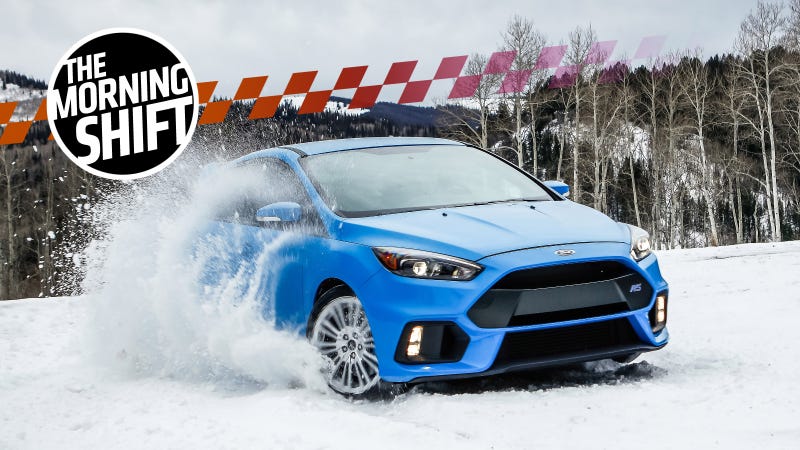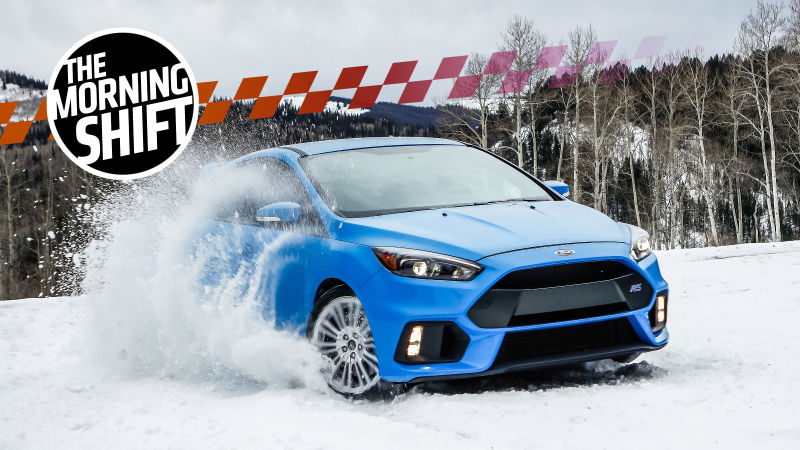
Good morning! Welcome to The Morning Shift, your roundup of the auto news you crave, all in one place every weekday morning. Here are the important stories you need to know.
1st Gear: Ford’s Also Making 25.5 Billion In Cuts
While we’re deeply saddened that our answer to “have you driven a Ford lately?” will be “no, because you killed off everything I wanted to drive,” Ford’s cuts don’t just end with axing most of its small cars and sedans from the North American market, reports the Detroit News.
Ford’s overall plan is to trim $25.5 billion in operating costs by 2022, which is all part of a “fitness” initiative by CEO Jim Hackett. The company originally announced $14 billion in cuts by 2022 in October, but has since found an extra $11.5 billion to hack away, primarily in marketing and sales, which includes Ford’s spending on incentives. The current plans will give Ford an eight percent operating margin by 2020, two years ahead of schedule, according to Forbes.
Ford Chief Financial Officer Bob Shanks told the Detroit News that there may be even more cuts to come, despite the company already surprising analysts by discontinuing more models in North America than expected. Hold on to your butts, Ford employees.
Advertisement
2nd Gear: FCA Lifted To Record Profits On The Dirt-Encrusted Roof Rack Of Jeep
Speaking of car companies that are doing just fine with barely any sedans—Fiat Chrysler Automobiles reported record first-quarter earnings, thanks in large part to everyone’s love for Jeep. The Detroit News writes:
Fiat Chrysler Automobiles NV reported record first-quarter earnings, due largely to strong Jeep sales, which climbed 37 percent worldwide.
The company said Thursday it grew its profit 59 percent compared to the same period a year ago, making $1.24 billion (1.02 billion euros), and achieved a 7.4 percent adjusted earnings before taxes and interest margin in North America, a 10-point jump compared to a year ago.
Advertisement
Lower financial charges and income taxes were also credited for the jump, but a 37 percent rise in Jeep sales is no slump. It’s also continuing a trend of growing profits for the company, as FCA CEO Sergio Marchionne said in January that the company’s net profit nearly doubled for 2017, The Detroit News notes.
Like Ford is attempting to do now (but uhhhh yikes), FCA axed its low-margin cars around two years ago. The company has also hacked its industrial debt down to $1.58 billion (with plans to get rid of it entirely by June), and increased its net revenue in the first quarter of 2018 by 2 percent.
3rd Gear: Sedans Just Aren’t Selling At Hyundai
And on the flip side, perhaps the biggest harbinger of the sedanpocalypse is Hyundai, whose sedan-heavy lineup just isn’t working out well for them. Hyundai’s quarterly profit halved to an almost six-year low thanks to bleak sales in the United States and China, reports Reuters.
Advertisement
Hyundai makes some pretty good cars nowadays, and they picked up some customers recently from GM’s struggling South Korean arm in their home market. But they haven’t responded fast enough to the demand for SUVs in two of its biggest markets, and that’s hurting them. Reuters writes:
The lackluster results serve as a reminder of how Hyundai, which has been in the red for five years, continues to struggle due to its heavy reliance on sedan sales and slow response to rising demand for sport utility vehicles (SUVs) in China and the United States, the world’s top two auto markets.
Hyundai shares fell almost 6 percent after it reported a January-March profit of 668 billion won ($619.15 million), the weakest since the first quarter of 2012 and below 1.3 trillion won reported in the corresponding 2017 period.
The result compared with an average forecast of 1 trillion won from analysts polled by Thomson Reuters I/B/E/S.
The earnings are “very shocking, more shocking than ever”, said Ko Tae-bong, an analyst at Hi Investment & Securities.
Advertisement
Yikes.
Reuters notes that Hyundai and its affiliate Kia have missed global sales targets for the past three years.
Hyundai also slowed production of its Sonata and Elantra sedans in its U.S. factory to cut supply of its slow-selling cars. That should pick back up when they start producing the next-generation Santa Fe SUV in as early as May.
Advertisement
It sucks about Ford, but the Hyundai and Jeep cases show why we’re in the climate we’re in.
4th Gear: China May Cut Its Import Duty In Half
China could chop its high 25 percent import duty it levies on passenger cars in half, which is good news for automakers who’ve been begging for better access to the Chinese market for years. Bloomberg writes:
The State Council, or China’s cabinet, is weighing plans to reduce the 25 percent levy that’s been in place for more than a decade — and a contentious issue for automakers seeking greater access to the biggest automobile market — to 10 percent or 15 percent, said the people, who asked not to be identified as the deliberations are private. An announcement of a decision could be made as early as next month, the people said, as President Xi Jinping delivers on a promise to open the country’s automobile industry to greater competition.
Advertisement
Luxury brands like BMW, Lexus, Porsche and Mercedes-Benz stand to win big if this goes through, as they tend to import more cars into the country. It’s not as big a deal for many American brands, which have partnered with local Chinese companies to produce their cars there. The only Focus variant that Ford plans to keep selling in the United States, for example, is the Focus Active crossover that will be made in China.
China imported 1.22 million cars last year, which accounted for 4.2 percent of its 28.9 million auto sales. That’s a lot of cars, amigos, and everyone outside China would like a bigger chunk.
Shares of those homegrown Chinese auto brands, such as state-sponsored BAIC (which is in a partnership with Daimler), fell in response to the news, but if things go to plan, that dip will hopefully be temporary. Many see opening up China’s auto industry to more foreign competition as a vital first step to Chinese automakers expanding their own foreign sales.
Advertisement
Of course, the one thing that might throw a wrench in this plan—at least on our end—is the Trump administration’s threats over tariffs that some fear could lead to a trade war between China and the U.S., Bloomberg notes. So far, China has responded with equal force to the United States’ macho posturing about tariffs, threatening to slap an additional 25 percent import duty on American cars over and above existing tariffs that apply to them. Ouch. That one stings more when everybody else is getting a cut.
5th Gear: Tesla’s Autopilot Head Has Left The Building
Autopilot chief Jim Keller is the latest Tesla executive to depart among several other high-profile execs who have left the company, Automotive News writes:
Keller, who joined the automaker two years ago and has a background in chip development, had his last day as a Tesla vice president on Tuesday, the company said in a statement.
Keller will be joining Intel, The Wall Street Journal reported, citing sources. Tesla declined to comment on this, while Intel was not immediately available for comment.
Advertisement
Tesla will backfill Keller’s spot with Pete Bannon, who has been with the company for over two years and who previously oversaw Apple chip development. Andrej Karpathy, the current director of AI and Autopilot Vision, will now head up Autopilot software.
It’s curious timing, however, and not just because Autopilot has been in the news over a fatal crash where Autopilot was engaged last month, which has placed additional scrutiny on Tesla’s semi-autonomous tech. Tesla has had several executives leave the company recently, as Automotive News notes:
Among executives exiting Tesla recently are Jon McNeill, the former global president of sales and service who left for Lyft in February. In March, Tesla confirmed that two of its top financial executives, Eric Branderiz and Susan Repo, had departed.
Advertisement
The Autopilot team itself has been facing a lot of turnover in particular, Automotive News reports, as companies strive to hire the best engineering talent to develop autonomous vehicles.
Reverse: Let’s Make A Deal!!!
Advertisement
Neutral: What’s Your Take On The End Of Small Cars And Sedans?
Let’s hear from you on this one: is Ford’s move to discontinue its slower-selling small cars and sedans a good one, or will their new lack of diversity in their offerings bite them later when market demands change?















